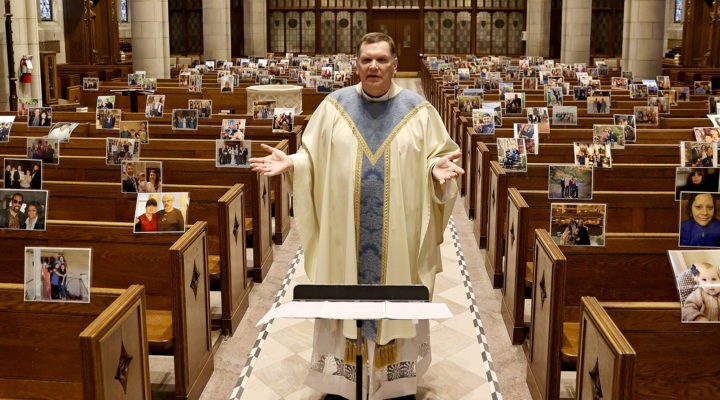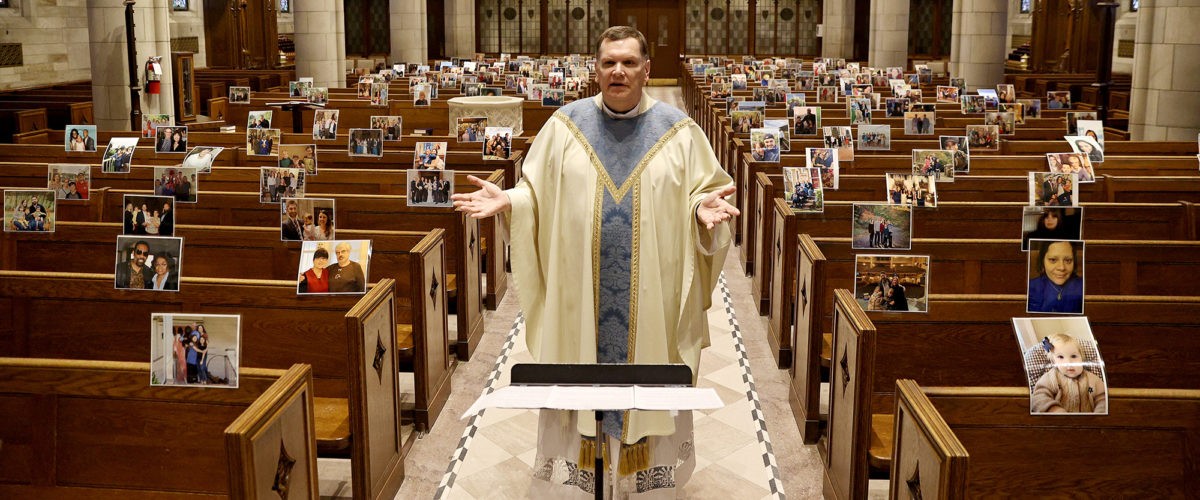Addressing racial justice issues from the pulpit in 2020 would have been challenging without the pandemic’s restrictions, but the task became daunting when it was coupled with the suspension of in-person worship.
That was an observation of some of the 10 pastors who were convened via Zoom recently by retired pastor and seminary professor Bob I. Johnson of Louisville, Ky. On two occasions during May, Johnson gathered pastors to discuss the nature of preaching during the pandemic. They came from seven states and represented Baptist, Methodist and Presbyterian traditions.
While in-person worship was halted to slow the spread of COVID-19, the United States began grappling with the unjustified police killings of two Black people, George Floyd in Minneapolis and Breonna Taylor in Louisville. Their deaths led to nationwide protests and calls for the country to address longstanding racial injustices.
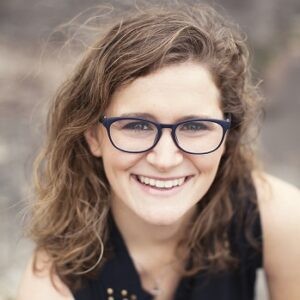
Courtney Stamey
Courtney Stamey, senior pastor of Northside Baptist Church in Clinton, Miss., said her congregation’s 50-year history of standing for racial justice was one of the reasons she felt compelled to speak to the issue. The church, she noted, is known to be a progressive congregation in Clinton, a community of about 25,000. “If we were not going to say something, the question was, who would?”
While not all members of her congregation have agreed with its racial justice stands, she nevertheless had a level of comfort addressing divisive issues among people she knows. Yet when her sermons were being streamed beyond the congregation to people she didn’t know, it made it harder to risk vulnerability, she said. “Are they people I can trust?”

Kevin Gardner-Sinclair
At Broadway Baptist Church in Louisville, the congregation went strictly to online worship the day after Taylor was killed in an apartment complex across town, said Pastor Kevin Gardner-Sinclair. “I can’t think of the pandemic without the racial justice movement. They are so intertwined.”
“I can’t think of the pandemic without the racial justice movement. They are so intertwined.”
He acknowledged some members left the congregation because “we engaged in the work of racial justice.”
Dartanya Hill, pastor of the predominanty Black West End Baptist Church in Louisville, said the dying phrase of Floyd, “I can’t breathe,” in the minds of Black people was connected both to the police killings and COVID-19. His congregation is located two miles from the site where thousands marched to protest police violence and to mourn for Taylor.
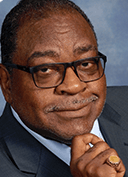
Dartanya Hill
“It may be hard to relate COVID to the phrase, ‘I can’t breathe,’ but there is a connection there of the pressures people were feeling just to be able to breathe during COVID and during these highly pressurized instances” of Taylor and Floyd’s deaths, Hill explained.
At the height of the unrest in Louisville, Hill inserted video clips of the protests into West End’s online worship services. In addition to addressing his congregation’s grief and the calls for racial justice and police reform, he also confronted the COVID crisis head on. He was especially concerned with “bad theology” that had convinced some that God’s protection made it unnecessary to be vaccinated and wear masks.
Speaking more broadly to the challenge of preaching on social issues without a physically present congregation, Matthew Sturtevant, pastor of First Baptist in Lawrence, Kan., said, “It’s tough to preach those types of sermons without looking somebody in the eye, without knowing where those folks are and what their immediate response is.”
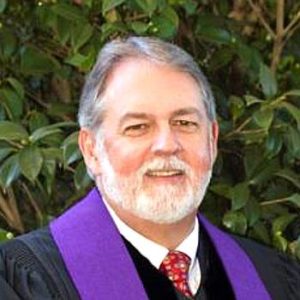
Dennis Foust
Dennis Foust, pastor of St. Johns Baptist Church in Charlotte, N.C., agreed that the inability to see a congregation’s reactions to the sermon posed a challenge. “What I found difficult during the pandemic was not being able to get that body language feedback, including the sleepers,” he said with a smile.
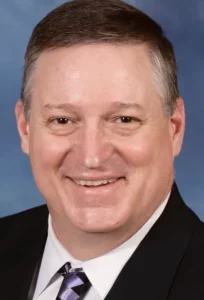
Doug Wintermute
The pandemic showed Doug Wintermute, pastor of First United Methodist Church in Jacksonville, Texas, the importance of a worshiping community that comes together in-person. “As the pandemic went on, we realized how important that physical connection is, just being with others,” he observed. “Really, there is something holy about it that can’t be explained, that Zoom just can’t fill.”
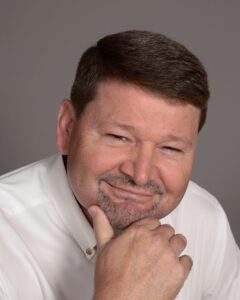
Drew Hill
Drew Hill, pastor of Memorial Baptist Church in Arlington, Va., said he was not prepared to preach in solitude. “I remember preaching class from seminary, and they never had you preach into your phone with nobody in the room.”
Nevertheless, the experience prompted a more relaxed tone in his preaching, he said. “It felt more conversational to me, more personal, and in the hearing, I think it was received more personally. I had a lot of people say, ‘You know, it feels like conversation. It kind of feels like we just sit down and talk. It kind of feels like we are having a cup of coffee together.’”
While many of the struggles associated with COVID-19 have abated, Kyle Childress, pastor of Austin Heights Baptist Church in Nacogdoches, Texas, said what some are calling a “COVID hangover” is affecting society, including churches.
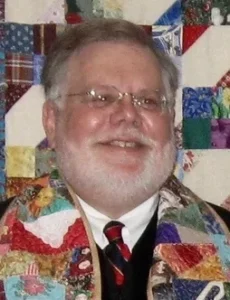
Kyle Childress
An ordained minister for 42 years, Childress said, “I’ve never seen as much brokenness, hurt, fear and anxiety as I have seen in the congregation — and I am in a pretty healthy congregation — since COVID.”
He expressed confidence his congregation would work its way through it, but he admitted, “I’ve never seen anything like it.”
Stamey said stress related to the pandemic had taken its toll on some of her clergy friends. Out of five ministers involved in a peer learning group, she is the only one still in congregational ministry. She called her friends who left parish work “some of the best pastors I know.”
The Zoom group for pastors that Johnson initiated may continue. Johnson has started a Google group for the Zoom participants to continue sharing ideas, and he said future Zoom meetings could be called based on the wishes of the group.
The idea for holding the online forums came when he and a group of mostly retired pastors were discussing the state of contemporary preaching, Johnson said. “I thought, ‘Why don’t’ we talk about this with people who are still preaching every Sunday.’” He asked pastors from his circle of acquaintances to participate, and he invited others whose names were suggested to him.
Johnson taught at Midwestern Baptist Theological Seminary and was dean of Southern Baptist Theological Seminary’s undergraduate division then known as Boyce Bible School. While he retired from academia more than 20 years ago, Johnson has remained active as an intentional interim pastor. He recruited two former colleagues from his Southern Seminary days, Charles Bugg and Wade Rowatt, to help facilitate the conversations.
Both Bugg and Rowatt left Southern Seminary in the 1990s and taught at other schools before their retirements. Bugg was at Baptist Theological Seminary at Richmond and Gardner-Webb University’s divinity school, and Rowatt concluded his teaching career at Baptist Seminary of Kentucky.
Pastors interested in joining the group may contact Johnson by email.
Related articles:
Pastors ponder pandemic preaching problems — and how they’ve survived

